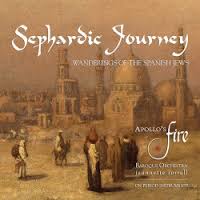by Julian Ring

For its latest release, the acclaimed Cleveland baroque orchestra Apollo’s Fire recorded a compendium of melodies from this nomadic sect. Ranging from the secular to the intensely sacred, the music on Sephardic Journey celebrates the plurality of influences the Sephardim acquired throughout their travels, as well as the remarkable ability of a people to adapt their culture to unfamiliar surroundings.
Artistic director Jeannette Sorrell reflects major themes in Sephardic Jewish life by dividing the album into sections: “The Temple,” “Love & Romance,” “The Sabbath,” and “Feasting & Celebration.” The disc begins with a prelude, “O! Jerusalem,” composed of two standout pieces: “Ir Me Kero, Madre, A Yerushalayim” (I want to go to Jerusalem, Mother) and “Kuando El Rey Nimrod” (When King Nimrod). Each song yearns for one of the Sephardic people’s dual homelands.
The first is a modal lament in which strings and oud snake across a dusty desert landscape. Lyrics sung by baritone Jeffrey Strauss and spoken interjections from soprano Nell Snaidas and tenor Karim Sulayman highlight both the sadness and urgency of a people displaced. The latter tune is more upbeat, with hand percussion and dulcimer providing the foundation for a mixed-meter dance. This juxtaposition sets up the larger contrast to come on Sephardic Journey, as moments of quiet holiness weave through full-bodied choral works and rousing fêtes.
The album’s “Temple” and “Sabbath” chapters prominently feature the work of 17th-century Mantuan composer Salamone Rossi in three excerpts from his cleverly-titled Songs of Solomon. Rossi was the only openly Jewish court musician in the service of the Duke of Mantua, hailed as chiefly responsible for the revival of Jewish sacred music during his era. For Songs of Solomon, he arranged traditional psalms and hymns in New Baroque polyphony. Think Monteverdi in Hebrew.
The style in which Rossi’s excerpts are composed lends some of the most spiritual pieces a church-like quality that sets them apart from the rest of the music on Sephardic Journey. Apollo’s Singers imbue these amalgamations of Hebrew texts and Baroque church music with vigor, precision and beauty. Though not always in sync with their accompaniment, the vocalists bring an expressiveness and enthusiasm to each chord change.
These selections are a powerful reminder that in the late Renaissance, religious music took on two very different forms for Christians and Jews. They also demonstrate the ingenuity of Rossi, a true musical chameleon often overshadowed by more recent Jewish composers. His presence on the program gives listeners a taste of the full Sephardic palette, even the more unconventional flavors.
The first globally-minded release from Apollo’s Fire, Sacrum Mysterium, deftly blended Celtic spirituality and traditional Scottish zeal. On Sephardic Journey, the backdrop has changed, but the enthusiasm and respect for the music return stronger than ever. The care with which Sorrell and guests have curated these twenty tracks shows. After several lifetimes in exile, the music of the Spanish Jews may finally have found the perfect home.
Published on ClevelandClassical.com February 16, 2016.
Click here for a printable copy of this article


